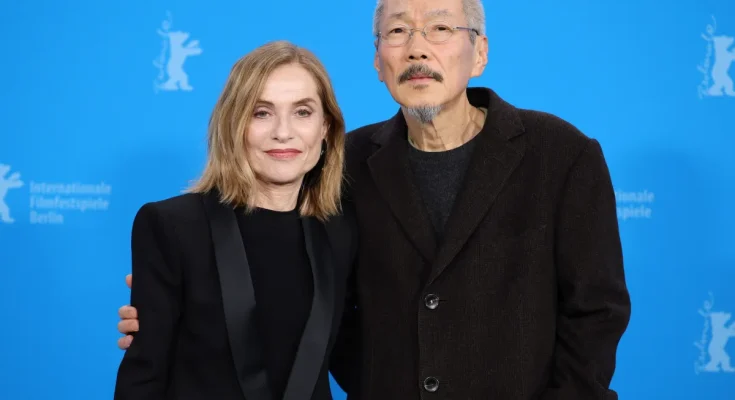“In Another Country,” “Claire’s Camera,” and now “A Traveler’s Needs” — Isabelle Huppert and Hong Sang-soo are three for three in conjuring one of contemporary cinema’s most psychically in-sync pairings. Hong, who has directed more than 30 films dating back to his 1996 debut “The Day a Pig Fell into the Well,” is a tireless achiever and one could say workaholic at the level of Rainer Werner Fassbinder, often releasing two films a year. While the sun-dappled and deceptively light “A Traveler’s Needs,” his loveliest and funniest film in years, debuted at the Berlinale in February, Hong already had “By the Stream” heading for Locarno this past summer.
In “A Traveler’s Needs,” which shot in under two weeks on location in Seoul, Huppert plays a drifting tourist named Iris who funds her walkabout by teaching French and piano lessons to locals. She gets by on the largesse of others — including a younger man she’s staying with, whose wife is irritated by Iris’ presence — and day-drinking bottles of the Korean rice drink makgeolli. Iris’ tutoring is shapeless and hardly encouraging, rousing skepticism in an older pupil (played by Hong regular Lee Hye-young) wary of her teacher’s unorthodox methods.
Huppert, speaking to IndieWire circa the feature’s New York Film Festival premiere, said that reuniting with Hong on a third movie was “completely by chance, a complete random.” They bumped into each other by chance at a French Cinematheque retrospective of Hong’s films in March 2023. “We met, and after we spoke for one hour, we said, ‘Why don’t we work together again?’” That June, they were shooting in Korea and “with no script, no role, no story. I don’t know how he does it. It’s a miracle.” Huppert, in other words, showed up to set with only a vague sense of what the movie was. And if you look at the credits, Hong does it all: not just writing and directing but also composing the music, producing the film, editing, and handling cinematography and lighting.
The Oscar-nominated “Elle” star is no stranger to traveling the world, but Hong has a way of making her see the other, less familiar side of any given location. With 2017’s “Claire’s Camera,” for example, they shot the movie in Cannes during the festival the year before when they both happened to be there for other projects. “I was there for ‘Elle,’ and so he took it as a good opportunity to do this movie. It was really funny because we did the movie off from the Croisette, and it was like Cannes [the festival] did not exist… It was like a vague event far away, and he really used that resonance as a background, not like he was trying to capture the observances of Cannes. It was just capturing the outskirts … I’ve been to Cannes so many times, I didn’t realize how much Cannes was so much concentrated on a very specific base, and apart from this [festival], it doesn’t exist anymore.”
Huppert noted how much Hong has pared down his approach to filmmaking compared to 2012’s “In Another Country,” where she played three different women, all named Anne, also vacationing but in a seaside town. Now, she said, “It’s only him and his little camera … He doesn’t need more. Most of the time, you spend so much time and money, if you wanted to really prove or demonstrate that moviemaking — I’m not saying always — is so [expansive], it can go from the infinitely big to the infinitely small, that’s what fascinates me.”

The daring “Piano Teacher” star and Cannes-winning actress (and recent Venice Film Festival jury president) was intimately involved in choosing the costumes for Iris, who looks small and unassuming in a green cardigan, flowery dress, and sunhat. “I bought that little dress just, like, literally two hours before I flew to Seoul,” she said. “I was walking near my house in Paris… I put many things in my suitcase. I knew [Hong] was going to choose once I arrived, but then I was attracted by this dress. I bought the green cardigan at that same shop. I had those shoes, which I’d just bought in Spain three days before… only the hat, I bought it in Seoul. He wanted the hat. He was sure of this. He wanted this hat. But already, it was the costume of the traveler. As I was traveling, I bought that dress and those shoes.”
So who is Iris before she shows up in Seoul and starts bemusing locals with her naive curiosity about local customs? She’s even like a psychoanalyst in the way her teachings bring out buried feelings and outside issues in her subjects. “In all Hong Sang-soo’s films, you don’t really have characters. She says certain things that resonate in a certain way, and she’s more an idea than a character, actually. If she’s a character, she’s halfway between a little witch and a little fairy… When I began the film, I had no idea [who she was]. I knew two hours before starting,” she said, as lines were given to her in the morning of each day of filming.
Ever a risk for any actor, but that’s in line with Huppert’s more relaxed approach to preparation. Even when playing a real-life trade unionist whistleblower in last year’s “La Syndicaliste,” she’s not doing obsessive amounts of research. That only contributes to her aura as an actress whose presence is the defining feature of her performance, not a bug of it, and so she doesn’t so much disappear into a role. Which is perhaps why she’s earned comparisons to Meryl Streep — you don’t forget it’s her onscreen.
“I never think in terms of a character. If you think about a character, it gives you limitations,” she said. “All we have to do is to be as real as possible. A character, you want to get into a certain pattern, which gives limitations. Of course, with Hong Sang-soo, it’s the perfect achievement of that. No character, no script, no story. No character. Just say the lines. I don’t know how he does. And I don’t even know how I do it, actually. That’s why I love it.”
Iris is constantly hitting up her hosts for a bottle of makgeolli, which Huppert said is “so good. It’s sweet. It’s not strong. You don’t feel like you’re drinking alcohol, which is the problem.” And Iris is drinking a lot of it, living for here and now only.
“I’m the tool for [Hong] to explore what it means to be a foreigner, what it means to be different from other people, what it means to try and make connections, but in a certain temper,” she said. “Maybe sometimes a certain melancholy, even though it’s not even something I play myself. He creates a certain atmosphere. It’s so poetic. Sometimes, you feel loneliness in this desperate attempt … it’s never desperate, but in the end you can see it as something desperate to try to connect with people, always trying to understand people and dig in their thoughts, their unconscious, their attempt to know more about themselves. That’s what [Iris] does. She tries to make people think about who they are.”



